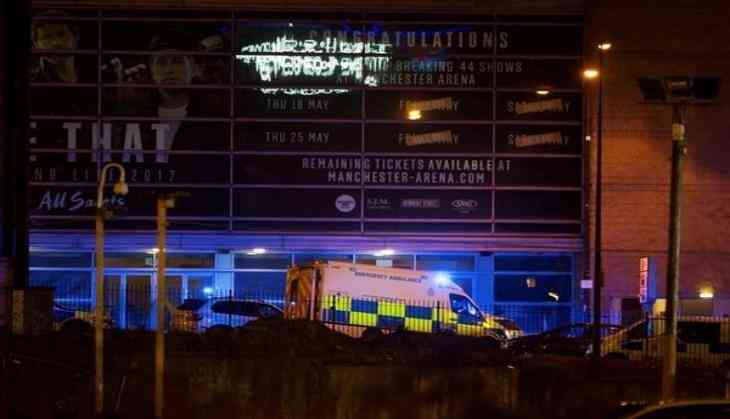
Nineteen people have been killed and about 50 injured in a suspected terror attack at the Manchester Arena.
The blast took place on the night of 22 may during a pop concert performed by the American singer Ariana Grande.
Following the attack, British Prime Minister Theresa May has suspended her general election campaign.
The Prime Minister said, "We are working to establish the full details of what is being treated by the police as an appalling terrorist attack. All our thoughts are with the victims and the families of those who have been affected."
Terror attack at Manchester Arena is just the latest in a long list of terror attacks on Britain since 9/11.
Here's a rundown of major attacks in London since 2001.
March 22 2017, UK Parliament
London attacker Khalid Masood mowed down pedestrians on Westminster Bridge, killing two men and two women and injuring many others.
He crashed his car into the railings outside Parliament, got out and ran into New Palace Yard where he stabbed a police officer to death.
Masood was eventually shot dead by armed police.
Police said they consider "Islamic terrorism" as the motive for the attack. The name of the attacker was not immediately disclosed.
December 7, 2015, Leytonstone Station Stabbing
An attacker stabbed multiple people in the Leytonstone Underground station in East London on Decmber 6, 2015. Muhiddin Mire, a 30-year-old taxi driver diagnosed with paranoid schizophrenia, randomly targeted people in the station in what he later claimed was an act of revenge for Western airstrikes on Syria.
In footage of the attack, commuters can be heard screaming at Mire to put down his knife. One man calls out "You ain't no Muslim, bruv." People on Twitter later took up the phrase as a way to emphasize that Mire's actions didn't represent Islam.
Mire was convicted for attempted murder and multiple counts of attempted wounding. Two doctors who reviewed the case disagreed on whether his mental illness, as opposed to his extremist beliefs, could be considered the cause for the attack.
May 22, 2013, Woolich
Lee Rigby, a 25-year-old British soldier, was killed in a terror attack in Woolwich, southeast of London, on May 22, 2013. Two assailants rammed Rigby with a car before stabbing and attempting to behead him on a street outside his army barracks. Horrified bystanders witnessed the attack, which was also caught on video.
The killers were two British Islamist extremists in their 20s who said they killed Rigby as an act of war. Both men were arrested at the scene and later convicted for murder. The violence of the attack shocked Britain, and prompted numerous memorials for Rigby.
March 7, 2009, Northern Ireland
On 7 March 2009, two off-duty British soldiers of 38 Engineer Regiment were shot dead outside Massereene Barracks in Antrim town, Northern Ireland. Two other soldiers and two civilian delivery men were also shot and wounded during the attack. An Irish republican paramilitary group, the Real IRA, claimed responsibility for the incident.
The shootings were the first British military fatalities in Northern Ireland since 1997. Two days later, the Continuity IRA shot dead a Police Service of Northern Ireland (PSNI) officer, the first Northern Irish police officer to be killed by paramilitaries since 1998. These attacks marked the beginning of the most intensive period of "dissident republican" activity since the start of their campaign.
7 July 2005, London Underground trains
On July 7, 2005, a series of suicide bombings in London killed 52 people and wounded more than 770. The attackers targeted the city's transport system, detonating bombs hidden in their backpacks on three London Underground trains. Around an hour later, a fourth attacker blew himself up on a double-decker bus.
The incident was one of the worst terror attacks in British history. Four British attackers linked to al Qaeda were found to have carried out the bombings, and all of them died in the blasts. On July 21, a similar plot failed when unexploded bombs were found on three subway trains and a bus.
August 3, 2001, Ealing Broadway
Seven people were injured after a car bomb exploded just after midnight in Ealing Broadway, west London. This was the last known attack carried out in the capital by the "Real IRA," a rogue faction of the Provisional IRA who did not accept the terms of the 1998 peace agreement. Four men were arrested and later sentenced in connection with the blast.
-ANI


